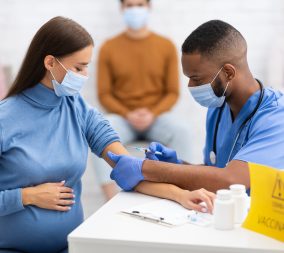Written By: Dr. Bernstien
Although initial data from the US and China did not demonstrate an increased risk of severe illness from Covid-19 among pregnant women, there is now much more data showing that pregnant women–especially those with comorbid conditions like obesity, hypertension, and diabetes and those who are Black and Hispanic– are at higher risk for becoming critically ill or dying. While the overall risk is still low, pregnant patients may be 3 to 5 times more likely to end up in an ICU or on a ventilator. When pregnant patients are extremely ill they are at a higher risk of preterm birth. There is even recent data that indicates there may be an increased rate of preterm birth and stillbirth among pregnant symptomatic and asymptomatic patients with Covid-19. Despite the increased risk to pregnant moms and the fact that passive immunity passed through the placenta to a fetus greatly protects a newborn, the pregnant population was excluded from participation in Covid-19 vaccine trials during this pandemic.
Since this pandemic began about a year ago, we have continued to advise pregnant patients (and all patients actually) to wear masks, wash hands, social distance, avoid large gatherings etc. We have had strict policies in our office and very limited access to our office from patients’ loved ones. Now, as I write this blog, the first Americans started receiving Covid-19 vaccines. Currently employees in the healthcare setting are being vaccinated around the country (and world) against Covid-19. Approximately 75% of healthcare workers are women, and the CDC estimates that over 300,000 healthcare workers are pregnant, will be pregnant, or will have recently given birth as the Covid-19 vaccine becomes more widely available to them. Soon it will be other higher exposure-risk jobs like teachers and other essential workers. Questions are pouring in from our pregnant patients asking our opinion if they should get the vaccine or not.
Why weren’t pregnant women included in the vaccine trials?
Pregnant women are excluded from clinical trials of medications and vaccines mostly because of fear for the safety of the fetus. Interestingly, many of these meds are used commonly because the patients need them and it’s YEARS later when they are officially given the “safe in pregnancy” designation. A recent example that many of you may remember is the use of Tamiflu during the H1N1 flu outbreak. Pregnant women were not included in those studies, yet we now know it is safe, and many lives of young healthy pregnant women could have been saved had it been studied and given earlier in the pregnant population. So years later, we are faced with an even bigger pandemic, and it’s rather sad that we even have to make educated “guesses” on whether or not our pregnant patients should be vaccinated.
Are these vaccines dangerous because they were made so quickly?
Vaccines are one of the greatest achievements of science and public health. Several vaccines have safely been given in pregnant women for decades. The monitoring of safety and efficacy of the Covid-19 vaccines has met the same high standards. The sheer amount of Covid-19 in the world and the willingness of participants (along with the fact that so much of the world’s scientific community and financial resources came together on this one project) has allowed for this vaccine to be made relatively quickly, without sacrificing safety standards.
How effective are the available vaccines?
The two vaccines approved at the time of writing this blog (Pfizer and Moderna), are both very effective. They seem to prevent Covid-19 in 95% of those who receive both doses. While they are effective in preventing symptomatic Covid-19 disease, it is still unclear whether the vaccines will be able to prevent you from getting an asymptomatic infection or spreading the virus silently to others. Thus, the precautions we already take are not going to be stopped any time soon.
How does the vaccine work?
The Pfizer and Moderna vaccines are in a category of vaccine called mRNA. These types of vaccines have been studied for years. They mimic how a virus works and allow the body to make a protein that it then responds to with antibody production (one of your body’s defense mechanisms). So no live virus is injected during vaccination, thus making it impossible to get Covid-19 from the vaccine itself. The injected mRNA breaks down quickly, so it lasts only a brief time in the body, just enough time to make the protein required for an antibody response. This mRNA never enters the nucleus of human cells and thus cannot alter the DNA (genetic makeup) of those vaccinated. Interestingly, the Ebola vaccine used similar technology and has been safely administered in pregnancy. Other Covid-19 vaccines that use more conventional technologies (like those used for the current flu vaccine) are still in their trial phases.
Will the vaccine protect my baby?
Maternal vaccination during pregnancy can help protect a newborn from potentially deadly infections. The mother forms the antibodies, for example against influenza and whooping cough which are vaccines widely accepted by most of our patients. These antibodies are then passed to the fetus through the placenta. This gives babies some protection. Antibodies are also passed through the breastmilk, continuing protection. Specific data on the Covid-19 vaccine is not yet available, but information from other respiratory vaccinations suggest newborn protection is likely.
Will the vaccine affect fertility or should it delay attempts at getting pregnant?
Despite misinformation on the internet, there is no reason to think a Covid-19 vaccine affects fertility. There is no evidence at this time that women who receive the vaccine should delay efforts of childbearing.
What are the side effects of the vaccine?
Side effects from the vaccine include injection site reactions (84%), fatigue (63%), chills (32%), muscle aches (38%), joint pain (24%), headache (55%), and fever (3.7% after the first dose and 15.8% after the second dose). Although pregnant women were not included in the vaccine trials, a few women did get pregnant after receiving the vaccine without known complications. The CDC does not recommend taking fever-lowering medication (acetaminophen) prior to receiving the injection. Instead, pregnant patients may take it if they notice fever after vaccination. Remember, having side effects of the vaccine does NOT mean you have a Covid-19 infection, but rather your body is responding appropriately to a vaccine.
Who should not get the vaccine?
If you have had a life-threatening response like anaphylaxis to previous injections or immunizations, you should not receive the vaccine until you have spoken to a specialist. Please note, people who have more common allergies to food, pollen, or medications taken orally are still eligible for vaccination.
What are the professional obstetrical organizations saying?
ACOG (The American College of Obstetrics and Gynecology):
- ACOG recommends that Covid-19 vaccines should not be withheld from pregnant individuals who meet the criteria for vaccination based on ACIP-recommended priority groups. (ACIP is the advisory committee on immunization practices.)
- Pregnancy tests should not be required prior to receiving the vaccine.
- While safety data on the use of Covid-19 vaccines in pregnancy are not currently available, there is also no data to indicate that the vaccines should be contraindicated.
- Pregnant women should be free to make their own decision on vaccination.
- Those considering the vaccine should consider the level of Covid activity in their community, the efficacy of the vaccine, the risk and potential severity of maternal covid disease, including the effects of the disease on the fetus and newborns, and the safety of the vaccine in pregnant patients and the fetus.
SMFM (Society for Maternal Fetal Medicine, high-risk pregnancy experts):
- SMFM applauds the FDA’s recent decision to allow pregnant women access to the Covid-19 vaccine and strongly recommends pregnant people have this access.
- A pregnancy test prior to vaccination is not recommended, nor is there data to guide timing of conception following vaccination. If a person decides to receive the vaccine, there are no trimester-specific vaccine considerations at this time.
- SMFM recommends pregnant women consider the potential benefits and unknown risks together when making vaccine decisions. This includes weighing the lack of data on vaccine safety for the fetus, the individual likelihood of the pregnant person acquiring a Covid-19 infection, and their individual risk of this infection.
- As data emerge, counseling and clinical recommendations will likely shift, as some vaccines may be more suitable for pregnant women. The currently available mRNA vaccines do not contain live virus and the theoretical risk of fetal harm is very low.
- SMFM will continue to monitor data as it becomes available on Covid-19 vaccine efficacy and safety to evaluate appropriateness in pregnancy and will continue to advocate for the ethical inclusion of pregnant women in ongoing and future trials.
So what is MY opinion?
As of this moment, I am very comfortable saying that the benefits of these first Covid-19 vaccinations for pregnant women or those planning on becoming pregnant outweigh the potential risks. I would be very comfortable with my loved ones getting a vaccine. I also understand the concerns about the unknowns that still exist and will be respectful of any woman that chooses not to get vaccinated. You need to make the choice for yourself, based on your individual risk factors and infection risks. I am confident the science will continue to support their use.


















